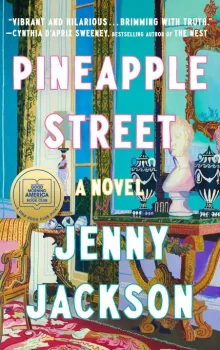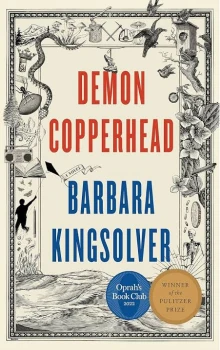SEVEN
Sasha
Georgiana was a wolf marking her territory, peeing around the perimeter of her den. When Sasha peeked through the door of Georgiana’s bedroom following her visit to “clean out her trophies,” she audibly gasped. “Cord! Come look at something!”
Cord ambled down the hall, holding a flaking croissant in one hand and a pack of polyester tennis strings in the other.
“Look.” Sasha gestured grandly at the floor, where a pile of old pens and crumbling erasers had been unceremoniously heaped on the rug. “And she didn’t take a single trophy! It looks like she burgled herself!” The drawers of her dresser were half open, hair ties were scattered on top along with several old ChapSticks. “She trashed the place.”
“It’s not trashed,” Cord said mildly. “It’s mostly little stuff.”
“But it’s pretty rude, right? To come over and make a mess?”
“She’s just kind of a slob.” Cord shrugged.
“Look, she went and found that old orange bedspread and put it on top of the white one I bought. It’s like she’s telling me it’s still her room.”
“Here,” Cord offered, scooping up the pens and dumping them into the desk drawer. “Her room was always a disaster, don’t take it personally.”
“I’m kind of starting to take it personally, Cord.” Sasha was honestly fed up. You could only be treated like an interloper for so long before you had to say something. “I’m not sure what I did wrong, but I just feel like your sisters don’t like me.”
“What are you talking about? That’s not true.” Cord patted her back and tried to leave the room. He was a WASP through and through, deeply uncomfortable with conflict.
Sasha pushed on. “They basically roll their eyes whenever I’m talking.” It was more than that, but it was hard to explain. How did you articulate how it felt to have someone constantly turn their back, wrinkle their nose, look away?
“Darley is distracted being a mom. And George is a kid. She only cares about tennis and partying with her friends. She’s on a different page right now. Just try to meet her where she is.” Cord winced as though this conversation was causing him physical pain.
Sasha saw the wince. She didn’t mean to punish Cord. She softened. “So I just need to start drinking White Claw and talking about the French Open and she’ll stop being so rude?”
The relief on Cord’s face was plain. Sasha would let it go. “That’s how I get women to like me. I pretend to care about things they care about.” He grinned. “Now—unrelated—let’s go drink wine, look at art, and throw away my high school stuff.”
Sasha laughed and followed him down the hall, closing the door to Georgiana’s room behind her. She grabbed a pinot grigio and two glasses and carried them to Cord’s bedroom, where she set them on the floor—there wasn’t any other clear surface. His single bed was piled with discarded treasures, mostly things from his grandparents’ apartment. When Cord’s paternal grandparents, Pip and Pop, passed away, the Stockton family decided to sell their brownstone on Columbia Heights. They took out half of the art and decor so the photographer could make the place look bigger, moving much of the stuff to Pineapple Street. The place had sold quickly, and nobody had time to deal with getting an appraiser to look at the antiques, so the limestone was overflowing with expensive castoffs. On Cord’s bed there was a Baroque-style giltwood mirror, a twenty-four-inch mantel clock with a base made of ornate bronze covered in gold leaf, an orange leather box containing a dozen fountain pens from Montblanc, and a stack of framed watercolors, mostly of boats. His bookshelf was stuffed with two layers of tattered old hardcovers, their scuffed brown and navy spines peeling and ragged. The desk was laden with file folders and newspaper clippings; Sasha had never seen a family more archival—they clipped newspaper articles daily, and Tilda read the morning paper with a small knife at her place setting, ever ready to slice away a piece of interest. All along the floorboards paintings in heavy frames stood four deep.
“I have a fun game for us to play,” Cord suggested, his eyes twinkling. “It’s called ‘By Birth or By Marriage.’ You have to guess who was a Stockton and who married into the family.”
“Okaaaay,” Sasha agreed, grinning and taking a swig of her wine.
“Number one: this fellow.” Cord lifted up an oil portrait of an older gentleman in a suit, posing formally with an Irish setter at his feet. He had Cord’s same dark eyes and brow, the same elegant nose.
“Birth.” Sasha rolled her eyes.
“Correct! That’s my grandfather, Edward Cordington Stockton. Okay, two: this lady.” Cord pulled out a smaller portrait, this one of a young girl, maybe eight, wearing a blue dress with a Peter Pan collar and a bow in her hair. She had Georgiana’s cascading curls, Georgiana’s pretty pout.
“Birth.” Sasha laughed.
“Ding! Ding! My grandfather’s sister, Mary. All right, this lady.” Cord pulled out a big painting in a gilded frame. The subject was fair, smiling coquettishly and holding a book in her lap. Sasha couldn’t see Darley or Chip or any of the Stocktons in her round cheeks or upturned nose.
“Marriage?” Sasha ventured.
“No idea,” Cord laughed. “I’ve never seen this one in my life! I think Pip must have bought it on eBay.”
Sasha pursed her lips. If you weren’t related by birth your name wasn’t worth knowing. Got it. She picked her way over to the desk to look at the file folders. Through the cloudy plastic Sasha recognized a face. She unwound the bit of twine and flipped the file open. It was Darley and Malcolm’s New York Times wedding announcement, clipped from the paper. They looked perfectly glamorous in their small, cropped headshot, Darley wearing a pair of glittering diamond earrings, Malcolm in a suit and tie. She skimmed the write-up. “Darley Colt Moore Stockton, daughter of Mr. Charles Edward Colt Stockton and Mrs. Matilda Baylies Moore Stockton, will be married this Saturday . . .”
“What’s that?” Cord peered over her shoulder.
“It’s Darley’s wedding announcement.”
“Oh.” He wrinkled his nose.
“You didn’t want one,” Sasha reminded him. She had mentioned it once when they were engaged, and he had immediately dismissed the idea.
“It’s just so gross and snobby.” Cord peered down at the photo of his sister. “So-and-so’s rich parents work in investment banking and so-and-so’s rich parents work in private equity and they are all just going to marry their children until they’re as inbred as King Tut.”
“Cordington Stockton, son of the New York real estate Stocktons, marries Rhode Island girl descended from barflies and fishermen,” joked Sasha.
“The service will be conducted at the Cap Club bar by the train station, and the bride’s brother, drunk on Narragansett, will officiate.”
“The reception will feature all-you-can-eat quahogs for those who know the proper way to pronounce the word for a water fountain.”
“It’s a bub-lah! And clam chow-dah!” Cord hollered.
“Hmmm, should we raise our kids to speak Rhode Island?” Sasha mused.
“Nope, Tilda would cut them out of the will.” Cord kissed her.
“We can’t throw any of this stuff away, can we?” Sasha took one last dismayed look around Cord’s room.
“We definitely cannot. Sorry. But now that we’ve had some wine and done some cleaning, we get to do your other favorite thing . . .” Cord batted his eyes playfully and took Sasha’s hand. She relented. Maybe she’d sneak some of the clippings into the shredder while he was at work. With that, Cord led her down the hall to their bedroom, to the four-poster bed she would always think of as his parents’.
Sasha had a pregnancy scare her freshman year of college. She and Mullin had been teetering on the cusp of another breakup, and things were tense between them. She was coming home for Thanksgiving, and she hoped that it would be easier where everything was familiar. She couldn’t shake the feeling that New York put Mullin on edge, that he somehow felt insecure or uncomfortable around the sophisticated and often rich kids she’d met at school.
It was tradition for everyone in town to go out to the Cap Club that Wednesday night—college kids who had moved away were home for the long weekend, eager to show off how well they were doing outside the confines of their little town. The Captain’s Club was nothing fancy—it was a long brick building across from the train station, where they served beer and cocktails and, if you really wanted it, a glass of wine that tasted like vinegar and probably had bits of cork in it. There were red leather stools along the bar, booths in the back, a jukebox, and a dartboard. Her cousins were there, the fact that most of them were under twenty-one politely ignored by the bartenders, who were all friends of the family. That was the thing about living in a small town—you got away with less, but you also got away with more.
Mullin was in a weird mood, laughing too loudly and drinking fast. Her younger brother, Olly, was wasted and being an idiot, wearing a T-shirt that said eat pussy, it’s organic, trying to light a cigarette inside and complaining when Sasha pushed him out into the alley to smoke. There were other kids from their class there too—kids who were at school in Boston, in Maine, in Connecticut. Sasha could tell it embarrassed Mullin that he still lived at home. He was smarter than nearly anyone in there, but instead of living in a dorm in New Haven or Princeton, he was sharing his childhood bedroom and driving back and forth to classes, mowing lawns in the early mornings and cleaning up the empty bottles his father left in the kitchen. She slung an arm around his waist and whispered in his ear, “Let’s go find a place we can be alone. I miss you.”
She had only had half a beer, so she drove them out to the causeway, where they parked on the gravel and looked out at the ocean. It was too cold to get out, so they kissed in the car, moving to the back seat to peel off their clothing. “I don’t have condoms, do you?” she asked.
“Nah, but I won’t finish,” Mullin promised. They started having sex and at first it felt wonderful, but then Sasha began to worry. “Don’t forget to pull out,” she whispered, but Mullin moved faster and faster. He came inside her with a groan and she shoved him off her body.
“What the fuck?”
“Sorry, sorry. You felt so good.” He pushed his hair out of his eyes.
“Mullin, I’m not on the pill.”
“It’ll be fine. Don’t worry. I’m sorry.”
Sasha yanked her clothing back on, angry at Mullin and angry with herself. As she lay awake in bed that night, having dropped Mullin at his own house, she wondered if it really was an accident or if Mullin wanted her back home, wanted to find a way to keep her here with him.
When her period was two days late, she went to campus health for a pregnancy test. It came back negative, and she cried, great heaving sobs, the sobs of exhaustion and anger and relief and probably also hormones, because her period came the next day.
Of course, she never told anyone in her family that story. Her mother would be furious with her for having unprotected sex; she would ban Mullin from the house. She had no idea how her father and brothers would react, but part of her suspected they would find her at fault. And it was her fault. She trusted someone who didn’t have her best interests at heart.
While it hurt Sasha that her family seemed unable to accept her breakup with Mullin, she was also moved by the way they made room for him. They saw his own family was lacking, and so they folded him in, setting out a stocking for him at Christmas, keeping the pantry full of Corn Chex and Pop-Tarts, foods only he ate. Sasha had initially thought that was what married life would be like—that she would marry Cord and his family would fold her on in. But they didn’t. Her own family was a restaurant booth—you could always scoot in and make space for one more. Cord’s family was a table with chairs, and those chairs were bolted to the floor.
A month before her wedding, a man in a suit rang the bell at her apartment. Sasha was home alone, eating a yogurt and working on her computer, designing layouts. She had been hired by a small contemporary art museum in Manhattan to design their new signs, shopping bags, and advertisements. She peered at the security screen and knew it wasn’t FedEx, so she scampered down the hall to put on a bra before opening the door.
“Are you Sasha Rossi?”
“I am,” she said with a confused smile.
“I’m a lawyer for Fox Allston, and we manage the Stockton family trust. We’ve prepared a prenuptial agreement for you to sign. I suggest you retain your own lawyer and he or she can be in touch to negotiate.”
“A lawyer?” Sasha asked, bewildered.
“You should always use a lawyer for this kind of agreement. I wish I could recommend someone, but unfortunately, you’ll need to retain a different firm. Give a call if you have any questions.” With that, the man handed Sasha a manila envelope and gave her a nod before trotting down the hall to the elevator bank.
“What the fuck?” Sasha carried the envelope to the kitchen and called Cord at work. “Cord, the weirdest thing just happened. A lawyer just showed up at the door and handed me a prenup! Like, I got served!”
“Hey, can we talk about this later? We’re in the middle of some stuff here,” Cord said.
“Oh, sure, yeah, tonight.” Sasha hung up. But that night, after dinner at his apartment, Cord had no interest in talking about it.
“Just get a lawyer and let them sort it out,” he said, shrugging.
“I mean, I will, but were you going to mention it to me?” she asked.
“What’s there to say? It’s paperwork. They’ll figure something out, you’ll sign it, we’ll move on.”
“I mean, for starters you could be like ‘I love you honey and I never want to get divorced.’ ”
“You can have your lawyer add that part.” Cord rolled his eyes.
“Ouch,” Sasha replied, offended.
“Look, it’s not up to me. Everyone signs them. It’s how marriage works. Marriage is a legal arrangement. This is part of it. Don’t make it a big deal.”
“Maybe in your world this is how marriage works, but not in mine. Do you think my parents have a prenup?”
“I don’t understand why you’re trying to make me feel so bad about this!” Cord said.
“Because it makes me feel bad!”
“It shouldn’t matter!”
“If it doesn’t matter, why didn’t you tell me about it?”
“Because it’s not a big deal!”
“You know it’s a big deal. I’m trying to build a life with you and you’re making it clear that you want to have an escape hatch. That no matter what, I’ll never really be part of your family.”
“We’re getting married. What else do you want from me?” Cord asked coldly.
“What else do I want from you? I want you to put me first. I want to be the most important person in your life. I want you to tell me that no matter what happens you will always be on my side. That you’d choose me over your family.”
“That’s a ridiculous thing to ask. I would never choose anyone over my family.” Cord walked into the bedroom and closed the door. Sasha stumbled out through the lobby and slept in her own apartment that night, getting up early the next morning and driving home to Rhode Island. She couldn’t stand to look at Cord, couldn’t imagine climbing into bed with yet another person who put her needs last.
When she told her parents what had happened her father was outraged. “He had a lawyer show up with papers like you were some parolee? That’s just wrong. If that’s how rich people act, you don’t want to be one anyway.”
Her mother was more sympathetic. “I had wondered if something like this might happen, sweetheart. These families can be very strange about who they marry. You have to assume this is coming from the parents, not from Cord.”
Sasha wasn’t sure, though. Maybe it came from Cord. Maybe it came from Chip and Tilda. But either way, she felt humiliated that they had talked about it, that they had made a plan against her, that rather than welcoming her with open arms they were shielding themselves from her infiltration.
She called her friend Jill, who was a lawyer in Providence, and they met for coffee. She passed her the manila envelope and Jill looked it over, nodding her head and making a few small notes on a pad with a pencil. “It’s a pretty generous prenup, Sasha. There are a few things that we would customarily ask for, but as these things go it’s on the nicer side of standard.”
“How standard is it, though? How often do people get prenups?”
“I think it’s something like five or ten percent among the general population, but obviously really common among people with means.”
“It’s hard not to feel offended by it. Like he thinks I’m trying to steal his money.”
“I’m sure for his family it’s as routine as getting braces or piercing your ears—just a step on the road to adulthood. Try not to read too much into it,” Jill said. Sasha wanted to believe her, wanted to let it go, but on nights she couldn’t sleep she still heard his voice, low but plain with honesty: “I would never choose anyone over my family.”
None of Sasha’s art school friends lived in Brooklyn Heights. As a rule, they lived in neighborhoods that required a subway transfer or a bus ride to visit, neighborhoods where the bodegas stocked spicy chips that were shaped like little cones and hurt your tongue to eat, neighborhoods where the water in the canal had a vaguely lavender tint. Sasha’s freshman-year roommate, Vara, chose to move to Red Hook, which, even though it was just a ten-minute bike ride from the limestone, felt like a hundred miles (or a hundred years) away. Vara’s big artists’ loft on Ferris Street was a stone’s throw from the waterfront, where a sugar refinery and shipyard crumbled prettily into the Buttermilk Channel. Big cranes moved shipping containers around the lot next door, graffiti covered the sidewalk, and the neighboring warehouses were rented out every weekend for hipster weddings.
On Wednesday nights, Vara hosted a Drink and Draw, offering terrible wine and a nude model to any former classmate with ten dollars to spare. Cord was working late and Sasha missed her friends, so she strapped on her helmet and coasted her bike down the hill. She got there five minutes early and threw a ten in the coffee can by the door, claiming a stool and an easel in the middle, right near Vara, so that they could gossip as they drew.
Vara was dressed outrageously as usual, wearing a canvas smock over a crop top and high-waisted pink silk pants. Her long black hair curled down her back, and she had on a pair of gold glasses that Sasha hadn’t seen before.
“Hey babe, let me see those.” Sasha reached out to snatch them from Vara’s face.
“No, no, I’m blind without them, don’t.” Vara ducked her head and danced away.
“Those are fake, right? You don’t need glasses.”
“I desperately need them, get away!” Vara squealed.
“Hmm, okay, so from now on every time I see you, you’ll have them on?”
“Well, probably not these glasses,” Vara hedged. “It depends on the outfit.”
“Mm-hmm, okay.” Sasha grinned.
A good group had already assembled for the Drink and Draw: Vara’s girlfriend, Tammie, puttered around opening bottles of red and white, sniffing the corks and making a terrible face. Simon, a painter with a shaved head, kissed Sasha hello and dropped his money in the can. Zane, with floppy hair and skateboarding shoes, worked at a foundry designing typefaces by day. Allison had brought her dog, a sleepy old Lab who immediately settled in by her feet to snooze. Sasha poured herself a big tumbler of white wine, took a sip, and shivered. It really was horrible, but maybe that was part of the charm of the evening.
As more and more of their classmates arrived and claimed easels, Vara checked her phone again and again, frowning with annoyance. “Ugh, I hired a new model tonight and he’s not answering his phone. I have no idea where he is.”
Sasha groaned. On nights when the model didn’t show, one of their classmates had to sit instead. They got half the money from the coffee can, but it was in no way worth it, spending an hour and a half frozen in the same position, muscles screaming, foot asleep. Last time Sasha had been stuck modeling she had a crick in her neck for a week.
At a quarter past seven, Vara gave up on the model and put a dozen paintbrushes in a jar, one of them marked with a blue tip. The loser would sit for the group. One by one they picked paintbrushes blindly, Sasha sighing with relief when she pulled a regular brown one. Zane pulled the blue brush and swore. “I got the fucking blue brush in February. This is bullshit,” he complained as he shucked off his long-sleeve shirt and pounded the rest of his wine. He stalked to the center of the room and unbuttoned his jeans, letting them slide to the floor. He was in a mood and Sasha fought back a grin. Nothing like staring at someone fume and pout butt naked for ninety minutes. Just then the door burst open, and a big, tattooed guy rushed in, dropping his bag and apologizing bashfully. The model had made it.
“Yes!” Zane hollered, yanking up his jeans, darting back to his stool, and pulling on his shirt. Everyone clapped and Vara patted him on the shoulder. It was funny, Sasha mused. She had seen most of her friends naked at some point in drawing class, and yet it was the least sexual thing in the world. But she still preferred it when they had a professional model. Often they were actors, and they brought specific energy to their poses, or they were significantly older, their bodies so different from Sasha’s own that she could get completely lost in studying the way the light moved on their skin. She loved drawing men with big muscles or low bellies, women with scars or thick, powerful calves—anyone who looked different, anyone who made her truly pause and see the shape of the human form anew.
Sasha set her plastic cup aside and started to sketch. Within minutes of the first pose the room was quiet, the sounds of pencils scratching interrupted only by the occasional murmur or the rustle of paper. As she drew, she amused herself thinking about how foreign her world would seem to Cord’s family. She wondered if Tilda ever saw a naked body beside her husband’s—or if she ever even saw his.
As she biked home later that night, slightly tipsy, she thought about her hometown. Maybe she loved Vara’s neighborhood because of the way it reminded her of Rhode Island. Unlike Brooklyn Heights, which was swarmed with tourists and bougie young parents, Red Hook was a decidedly blue-collar part of the city. It just made sense to Sasha in a different way.
Back in Rhode Island, there was a little scrap of shoreline along the river by Sasha’s parents’ house where Mike Michaelson kept his dinghy. Sure, most people kept their dinghies in their yards or paid to chain them to the dock, but Mike Michaelson was at least eighty years old, and nobody expected him to lug the thing a block to his house—he’d always kept it there. Then one year a new family bought the giant house across the street and claimed that the grass along the water’s edge belonged to them—that it was included in their deed. They posted a small sign that said private property. no boats allowed. Mike Michaelson’s dinghy stayed and the next day another appeared beside it. The day after that yet another. Soon there were thirty dinghies all piled on the shore, and everyone who went by the docks on their way to their moorings snapped pictures and cackled. The new owners took down the sign.
The more Sasha tried to fit in with Cord’s family the more she thought about those dinghies. Every society had traditions, institutional knowledge, their own innate sense of how things should be done. If you grew up in a snowy climate you knew to pop up your windshield wipers before a big storm. On Lower Road if you shoveled out your car you put a beach chair in the spot to make sure it was there when you got back. When you took your boat back up the river you kept the red buoys on the right and watched your wake around the little boats. At the bar, a coaster on top of a pint glass meant the seat was taken and the drink was still good. These rules were so deeply ingrained in Sasha that she barely had to think twice about them, but suddenly, with Cord, she was subject to an entirely different array of social niceties: You cleaned the lines on the clay tennis court after a match; you never wore denim to the club; you didn’t show up with wet hair; you said “Nice to see you,” never “Nice to meet you,” even if there was no conceivable way you’d ever crossed paths before in your life.
Sasha felt wrong-footed 90 percent of the time but also simultaneously felt she was Molly Ringwald in an eighties movie and everyone else was the preppy villain. Cord’s world was full of pearl girls, all wearing their grandmother’s earrings with crisp button-downs and loafers, as interchangeable as they were sexless. Sasha often had the sneaking suspicion that if she saw them naked, they would have bodies as smooth and flat as Barbies. She swore to herself that the day she tied a cable-knit sweater around her shoulders would be the day she died.
When Cord had suggested they move into the Pineapple Street limestone after their wedding, Sasha hesitated. Sure, it was big and nice, but she never felt comfortable there. Sasha loved her own apartment, a glass box in a doorman building in Downtown Brooklyn. The windows stretched floor to ceiling, and she could see all of Manhattan spread out across the river. It was new construction, all white walls and chrome appliances, and Sasha loved the modern spareness. She kept it neat as a pin—she tucked away her books and pretty vases, didn’t even put art on the walls, loving the feeling of giving her eyes a break after a day of working on her computer in Photoshop.
The Pineapple Street apartment was anything but spare—sometimes Sasha felt the clutter was going to send her into an epileptic fit, overwhelming her like a strobe light. “How about instead of the limestone we move into my apartment after the wedding?” Sasha tried to entice Cord.
“Your apartment is a one-bedroom, and we want kids. We’d outgrow it in a year. This is a no-brainer, Sasha. My parents are giving us a four-story house to live in.”
She could tell he really wanted to live there, she could tell he loved the place, so even though it killed her to leave her glass box in the sky, she said yes.
Right away she sensed it caused tension with Darley and Georgiana. She couldn’t tell if they were mad that Chip and Tilda had moved out or that she, an outsider, had moved in, but there was a decided chill in the air whenever they talked about the move. At first Sasha was sympathetic, but it started to wear on her. Yes, they had grown up there, but they each had an apartment of their own. They had their country house on Spyglass Lane. Now they had the maisonette on Orange Street. Through Chip and Cord’s company they owned half of Downtown Brooklyn and Dumbo. The family was lousy with property, and they were going to put up a stink about her living in a place that felt like an expensive mash-up of Antiques Roadshow and Hoarders? They were spoiled. There was no other way to say it.
She didn’t resent them for growing up with money—Sasha had led a lucky life herself. She had never skipped a class field trip, she had taken piano lessons and gymnastics and played softball in the town league. But she also vacuumed her own bedroom, loaded the dishwasher after dinner, took out the trash on her night. Cord never even wiped out the sink after he shaved, so sure someone else would be along to do it. As a teenager, Sasha also worked jobs after school and in the summers. She sold trees at the garden supply store, she answered phones at the electric company, her brothers had paper routes and delivered boat parts to the marina. Meanwhile Cord and his sisters played sports, went to summer camp, and then graduated to internships. Their summers were designed to enrich their minds and bodies, while her summers were meant to pay for college.
The weird thing was, though, Sasha wouldn’t have traded places with them. She loved working at the garden store (the electric company was less picturesque), and even when it sucked, it had taught her how to work. Sasha wanted to be successful, and she understood that if she wanted to do anything of significance it was on her to make it happen. She had a career as a graphic designer, she could support herself, and she did it all on her own. And yet, here she was, living in the limestone on Pineapple Street, feeling like an interloper, watching Georgiana pile dinghy after dinghy on her tiny scrap of shoreline.
Sasha pushed her bike up the steep hill from Dumbo, and when she reached the house she carried it down the steps to the basement and locked the door behind her. She dropped her keys on the table in the parlor, fighting a strange mood that had overtaken her. But she heard quiet jazz music playing. She could smell garlic and tomatoes in the kitchen and realized that she was starving. Cord came out of the kitchen holding a fistful of silverware, and when he saw her his eyes lit up. “My little Van Gogh!” he cried, wrapping her in his arms. “How is the ear?” He pretended to examine her as he kissed her neck. It wasn’t home, it wasn’t Red Hook, but as Cord fed her pasta and then took her to bed, it wasn’t a blue paintbrush either.







